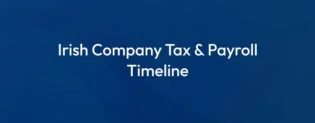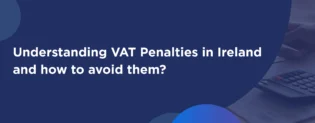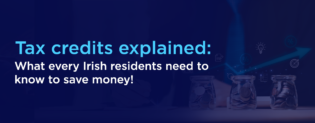Ireland is modernising its VAT system with the introduction of mandatory e-invoicing and real-time VAT reporting under the EU’s VAT in the Digital Age (ViDA) initiative.
Starting November 2028, large VAT-registered corporates for domestic B2B transactions must comply, expanding to all cross-border traders by 2030, will need to issue and receive invoices in a structured electronic format that machines can read automatically.
This change replaces traditional paper and PDF invoices, aiming to significantly reduce VAT fraud and cut administrative costs while aligning Ireland with EU digital tax standards.
To comply, Businesses must upgrade their systems, ensure data accuracy and adopt new technologies like the PEPPOL network for secure invoice exchange, making early preparation essential for a smooth transition to this transformative way of handling VAT. Minister for Finance Paschal Donohoe confirmed these plans during his Budget 2026 speech in October 2025.
Key takeaways
- Ireland is introducing mandatory E-invoicing and real-time VAT reporting by July 2030 under the EU ViDA rules.
- The phased E-invoicing rollout Ireland has three phases starting with large companies in November 2028, then all cross-border traders in 2029 and full EU-wide compliance in 2030.
- All Businesses must be able to receive e-invoices from November 2028.
- Paper and PDF invoices will no longer be accepted. Invoices must follow the EN16931 invoice standard in Ireland.
- This will help reduce VAT fraud by about €11 billion a year and save billions in admin costs.
- Businesses should start now by reviewing systems, cleaning data and planning upgrades.
- The PEPPOL network will be used to securely exchange invoices.
- Revenue will provide support throughout the change.
- Early prep and training are key to smooth digital VAT compliance in Ireland.
What is ViDA?
ViDA in Ireland stands for VAT in the Digital Age. This EU-wide reform aims to modernise VAT systems across all member states. The European Council adopted ViDA in March 2025 to combat VAT fraud and reduce costs.
The ViDA framework focuses on three main elements:
- Mandatory E-invoicing Ireland for cross-border EU Business-to-Business (B2B E-invoicing Ireland)
- Real-time VAT reporting in Ireland to tax authorities
- Elimination of monthly VIES returns for Businesses
According to EU estimates, VAT modernisation in Ireland will help reduce VAT fraud by up to €11 billion annually. They will also cut administrative and compliance costs by over €4.1 billion over ten years. The EU reported a VAT gap of €89.3 billion for 2022, representing about 7% of expected revenue.
What does ViDA stand for in practice?
For Irish Businesses, digital VAT compliance Ireland translates into concrete operational changes. Digital VAT requires structured electronic data transmission from end to end.
The transformation affects how Businesses:
- Issue invoices to customers and suppliers
- Report transaction details to Revenue
- Maintain compliance with cross-border EU trading rules
- Process VAT refunds and reconciliations
Understanding digital VAT and E-Invoicing
Traditional invoicing includes PDF invoices and scanned paper documents. These formats will no longer satisfy VAT compliance requirements under ViDA Ireland.
Digital VAT requires structured electronic invoices that machines can automatically process.
E-invoicing Ireland refers to the electronic transmission of structured invoices through digital systems. The process creates, sends, receives and processes invoices entirely electronically.
This end-to-end digital approach ensures data accuracy and enables real-time reporting.
What is real-time VAT reporting?
Real-time VAT reporting in Ireland means sending transaction data to Revenue immediately after issuing invoices. Suppliers must issue e-invoices within 10 days of a transaction. They must also digitally report specified data to Revenue during this timeframe.
This system replaces the aggregate reporting model that Ireland has used since 1972. Instead of periodic returns based on total sales and purchases, businesses report individual transactions. The new approach provides Revenue with high-quality, timely data to combat fraud.
ViDA implementation timeline in Ireland
Revenue has structured the rollout to give Businesses adequate preparation time. The phased approach allows early adopters to test systems before wider implementation. It also ensures Ireland meets mandatory EU deadlines while supporting Business transition.

Phase 1: November 2028
Who it affects: VAT-registered large corporates
Scope: Mandatory E-invoicing in Ireland and real-time reporting for domestic B2B transactions
Key requirement: All Businesses must be enabled to receive e-invoices in Ireland.
This phase targets a small group of well-resourced Businesses. Large corporates often have existing international experience with similar systems.
They are best positioned to adapt to digital changes and provide valuable early feedback. Even if your Business isn’t required to issue e-invoices yet, you must receive them. Revenue recognises that E-invoicing is an end-to-end digital process.
The ViDA Directive creates a legal obligation for Business customers to accept e-invoices from suppliers.
Phase 2: November 2029
Who it affects: All VAT-registered Businesses engaged in cross-border EU B2B trade
Scope: Mandatory E-invoicing for domestic B2B transactions
Benefit: Time to familiarise with systems before EU-wide mandate This extension covers all Businesses that benefit from 0% VAT arrangements for intra-EU trade.
The timing provides Businesses with domestic experience before the EU system becomes mandatory. It also ensures Irish companies won’t face competitive disadvantages in the Single Market.
Phase 3: July 2030
Who it affects: All VAT-registered Businesses engaged in cross-border EU B2B transactions
Scope: Full implementation of EU ViDA requirements for intra-EU trade
Critical deadline: Businesses must comply to maintain 0% VAT treatment. This phase makes E-invoicing mandatory across all EU member states for cross-border B2B transactions.
Irish Businesses already operating under the domestic system will transition smoothly.
Access to current 0% VAT arrangements depends on operating compliant E-invoicing systems.
| Phase | Start date | Businesses affected | Scope | Key requirement |
|---|---|---|---|---|
| Phase 1 | November 2028 | Large corporates | Domestic B2B transactions | Mandatory E-invoicing and real-time VAT reporting; must receive e-invoices |
| Phase 2 | November 2029 | All cross-border EU traders | Domestic B2B transactions | Mandatory E-invoicing |
| Phase 3 | July 2030 | All cross-border EU traders | Cross-border B2B transactions | Full EU-wide E-invoicing compliance to maintain 0% VAT benefit |
Important: All Businesses must be able to receive e-invoices in Ireland from November 2028.
Technical requirements for E-Invoicing in Ireland
To ensure seamless digital invoicing across the country, Ireland is aligning its systems with EU-wide E-invoicing standards. These technical requirements aim to create a consistent, secure and automated invoicing environment for all Businesses. The framework focuses on compliance and smooth integration with existing financial systems.
| Requirement | Description |
|---|---|
| EN16931 Standard | Specifies structured data so systems can automatically read and process invoices. |
| PEPPOL Network | Used for secure electronic exchange of invoices across EU borders. |
| Structured data format | Replace image-based PDFs for consistency and automation. |
| Secure transmission protocols | Protect invoice data integrity during exchange. |
EN16931 Invoice standard compliance
The ViDA Directive requires e-invoice structures to comply with European Standard EN16931 in Ireland.
This standard uses structured data formats that enable automatic processing. It ensures consistency and interoperability across all EU member states.
The technical framework includes:
- Structured data formats instead of image-based documents
- Standardised field definitions for invoice elements
- Automated processing capabilities
- Secure transmission protocols
PEPPOL framework integration
The Pan-European Public Procurement Online (PEPPOL) network will support Ireland’s E-invoicing infrastructure. Irish public sector bodies have used PEPPOL for Business-to-Government (B2G) transactions since 2019.
This proven platform provides secure, standardised electronic document exchange. Revenue is working closely with the Office of Government Procurement, Ireland’s PEPPOL authority.
They are preparing for significant expansion in network usage as Businesses adopt E-invoicing. The existing infrastructure helps Businesses readily adopt the new requirements.
GDPR & Data protection compliance
E-invoicing involves sharing and storing structured data containing customer and supplier information. Businesses must ensure full GDPR compliance by:
- Using only authorised, secure systems and service providers.
- Restricting access to financial data through role-based permissions.
- Encrypting all data transfers within and outside Ireland.
- Retaining invoice data for statutory periods under Revenue guidelines.
Data controllers and processors must ensure that invoice data is handled, stored and transmitted in line with EU GDPR and Irish Data Protection Commission requirements.
What Irish Businesses must do now?
Preparing early for Ireland’s E-invoicing rollout will help Businesses transition smoothly and avoid last-minute challenges. The following steps outline how to align systems, data and teams with the upcoming ViDA requirements.
1. Assess your current position
Determine which phase applies to your Business:
- Are you a large corporate? You’ll start in November 2028.
- Do you engage in cross-border EU B2B trade? Phase 2 affects you from November 2029.
- All Businesses must be ready to receive e-invoices by November 2028.
Review your current invoicing and reporting processes. Identify gaps between your existing systems and ViDA requirements. Calculate the resources needed for transformation.
2. Evaluate your technology infrastructure
Check whether your current systems support structured electronic invoicing. Most ERP system upgrades for E-invoicing will be necessary for compliance. Assess integration capabilities with PEPPOL and other required platforms.
Key technology considerations:
- Can your accounting software generate EN16931-compliant invoices?
- Does your system support real-time data transmission to Revenue?
- Can you receive and automatically process structured e-invoices?
- What VAT on software Ireland costs should you budget for upgrades?
3. Review master data quality
Real-time reporting demands accurate, complete master data.
Customer and supplier records must contain all required fields for E-invoicing.
Tax codes, VAT registration numbers and reporting mappings need verification.
Strengthen your data governance:
- Clean up customer and supplier databases
- Standardise data entry protocols
- Implement validation rules for critical fields
- Train staff on data quality importance
4. Engage with E-Invoicing companies
Many Businesses will need external support for mandatory E-invoicing Ireland implementation. E-invoicing companies offer software solutions, integration services and ongoing support. Early engagement helps you understand options and plan implementation timelines.
When evaluating E-invoicing companies, consider:
- EN16931 and PEPPOL compliance
- Integration capabilities with your existing systems
- Support for both domestic and cross-border transactions
- Training and change management services
- Ongoing technical support
5. Plan testing and training
Build a comprehensive test plan that includes:
- Pilot entities within your organisation
- End-to-end transaction testing
- Internal control validation
- User acceptance testing
Schedule training well ahead of your applicable phase. Staff across finance, IT and operations need to understand the new processes. Change management is crucial for successful implementation.
Benefits of digital VAT compliance
The digital VAT modernisation in Ireland brings efficiency and transparency to both Businesses and tax authorities. By shifting to real-time data exchange, it simplifies reporting and strengthens compliance across the board.
For Businesses
The VAT modernisation Ireland programme offers significant advantages:
- Reduced administrative burden through automated processes
- Elimination of monthly VIES returns saves time
- Faster VAT repayment claims through real-time data
- Fewer compliance interventions for compliant Businesses
- Lower risk of errors in VAT reporting
Integration with existing Business processes creates substantial efficiencies.
Businesses can achieve time savings and cost reductions while ensuring accuracy.
The digital approach supports Ireland’s broader Business digitalisation strategy.
For Revenue Administration
Real-time transaction data enhances Revenue’s capabilities:
- Early identification and resolution of discrepancies
- Better support for Businesses through proactive engagement
- More effective focus on high-risk areas
- Reduced VAT fraud across the economy
- Improved service delivery to compliant taxpayers
Compliance checklist for Irish Businesses
| Action item | Priority | Target completion |
|---|---|---|
| Identify applicable phase | High | Immediate |
| Assess current systems | High | Q1 2026 |
| Budget for technology upgrades | High | Q2 2026 |
| Select E-invoicing solution | Medium | Q3 2026 |
| Clean master data | High | Q4 2026 |
| Implement system changes | High | 2027 |
| Conduct testing | High | Early 2028 |
| Train staff | High | Mid 2028 |
| Go live (Phase 1/2) | Critical | November 2028/2029 |
Potential penalties & non-compliance risks
Non-compliance with ViDA e-invoicing requirements may result in:
- Administrative penalties under Irish VAT law
- Denial of 0% VAT treatment for cross-border transactions
- Delayed VAT refunds or additional reporting scrutiny
- Reputational risks with customers and suppliers
- Possible Revenue audits or sanctions for repeated non-compliance
Businesses should ensure all systems and staff are fully prepared before their respective go-live dates to avoid such risks.
Common challenges and solutions
Transitioning to E-invoicing and digital VAT compliance brings several operational and technical challenges. Understanding these early can help businesses plan effective solutions and avoid costly delays.
Challenge 1: System compatibility
Many Businesses use legacy systems that don’t support structured E-invoicing.
Solution: Start ERP system assessments early and budget for upgrades or replacements.
Challenge 2: Data quality issues
Incomplete or inaccurate master data prevents successful real-time reporting.
Solution: Implement data cleansing projects and establish ongoing quality controls.
Challenge 3: Resource constraints
Small and medium Businesses may lack IT resources for implementation.
Solution: Engage E-invoicing companies that offer managed services and support.
Challenge 4: Cross-system integration
Connecting E-invoicing platforms with existing accounting systems can be complex.
Solution: Choose solutions with proven integration capabilities and API support.
VAT Processes that will change
The transformation affects multiple VAT processes across your Business:
Invoice issuance:
- Move from PDF or paper to structured electronic formats
- Implement 10-day issuance requirement
- Enable real-time data extraction and reporting
Invoice reception:
- Accept structured e-invoices from all suppliers
- Automatically process incoming invoice data
- Integrate received data with accounting systems
VAT reporting:
- Shift from periodic aggregate returns to transaction-level reporting
- Eliminate monthly VIES returns for cross-border transactions
- Enable real-time data transmission to Revenue
VAT reconciliation:
- Use real-time data for continuous reconciliation
- Identify and resolve discrepancies faster
- Improve accuracy of VAT positions
Support and resources from Revenue
Revenue has committed to comprehensive support throughout the transition. They recognise the significant change this represents for Irish businesses. Multiple engagement channels will provide guidance and assistance.
Available support channels
- Direct communication: Revenue will contact all Businesses affected by the new requirements directly. Targeted communications will provide phase-specific guidance and deadlines.
- Online resources: Comprehensive information is available on the Revenue website.
Technical specifications and guidance will be published well in advance of each phase.
Regular updates will keep Businesses informed of progress. - Stakeholder forums: Revenue engages with stakeholders through the Tax Administration Liaison Committee (TALC). Dedicated forums bring together Business associations, tax practitioners and software providers. These channels ensure practical implementation considerations inform system design.
- Industry engagement: Revenue intensified engagement with all stakeholders following the October 2025 announcement. Ongoing dialogue with the software industry helps develop practical solutions. Collaboration with Business associations addresses sector-specific concerns.
EU VAT Reform
Ireland’s approach aligns with broader EU VAT modernisation efforts. Most EU member states are implementing or have already implemented mandatory E-invoicing.
Until now, Ireland was one of very few countries not operating such systems. The phased implementation puts Ireland on track with international best practice.
It supports “The Digital Ireland Framework,” the Government’s digital leadership strategy. The goal is to increase digital technology adoption, especially among SMEs.
This alignment helps Irish Businesses:
- Compete effectively in the Single Market
- Access favourable VAT treatments for cross-border trade
- Benefit from reduced compliance costs over time
- Participate in EU-wide digital commerce infrastructure
| Aspect | Current system | New system |
|---|---|---|
| Invoice format | PDF, paper accepted | Structured electronic only |
| Reporting timing | Periodic (monthly/bi-monthly) | Real-time (within 10 days) |
| Data granularity | Aggregate totals | Transaction-level detail |
| VIES returns | Monthly submission required | Eliminated |
| Cross-border validation | Manual reconciliation | Automated through real-time data |
| Fraud detection | Retrospective analysis | Proactive, real-time monitoring |
Glossary of technical terms
PEPPOL: A secure, standard digital network used across Europe for exchanging electronic documents like invoices reliably and safely.
EN16931: The European standard that defines the format and data structure for electronic invoices, ensuring they can be automatically processed by Business systems.
VIES: The VAT Information Exchange System, an EU tool used by tax authorities to verify VAT numbers and transactions between member states, facilitating cross-border VAT compliance.
Conclusion
Ireland’s ViDA and E-invoicing rollout represents transformational change. The phased approach from 2028 to 2030 provides adequate time for preparation.
However, Businesses must start planning and acting now. The shift to digital VAT compliance offers significant long-term benefits. Reduced administrative costs, faster processing and improved accuracy make the investment worthwhile. Ireland joins international best practice while ensuring continued access to EU Single Market advantages.
Frequently Asked Questions (FAQs)
What is the EN16931 invoice standard?
Do tax rates change under ViDA?
What if my Business operates across multiple EU countries?
Can I continue to trade cross-border without E-invoicing?
What support is available for small Businesses?
How will this affect my ERP system?
What is PEPPOL and do I need to use it?
When should I start preparing?
Parul is a content specialist with expertise in accounting and bookkeeping. Her writing covers a wide range of accounting topics such as payroll, financial reporting and more. Her content is well-researched and she has a strong understanding of accounting terms and industry-specific terminologies. As a subject matter expert, she simplifies complex concepts into clear, practical insights, helping businesses with accurate tips and solutions to make informed decisions.







